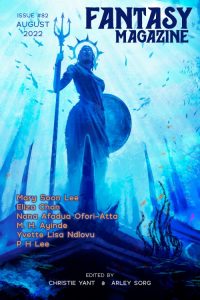Rich Horton Reviews Short Fiction: F&SF, Galaxy’s Edge, Zyzzyva, Interzone, and Mythic Journeys
 F&SF 3-4/19
F&SF 3-4/19
Galaxy’s Edge 3/19
Zyzzyva Winter ’18
Interzone 3-4/19
Mythic Journeys, Paula Guran, ed. (Night Shade) May 2019.
Sometimes I fail to mention stories that may not be earthshaking, but are good fun. In the March-April F&SF, for example, I enjoyed several stories greatly, without necessarily, say, putting them on my prospective Hugo Award nomination list. To wit: Gregor Hartmann‘s “The Unbearable Lightness of Bullets” is a detective story focusing on Inspector Philippa Song’s investigation of the murder of a currency speculator on a remote planet. It’s a decent mystery (with a solution that would work today), entwined with nice character interactions involving Philippa and her new assistant, as well as her aging mother’s problems, and, peripherally, her planet’s place in the Galactic polity. Another mystery of sorts is “The Plot Against Fantucco’s Armor” by Matthew Hughes, in which recurring character Baldemar and his employer, the wizard Thelerion, are unfortunately implicated in a scheme involving the ducal succession in their town. This is, as ever with Hughes, arch and amusing and at bottom sensible. Most fun of all, perhaps, is Tina Connolly‘s hilarious “miscellaneous notes from the time an alien came to band camp disguised as my alto sax“, which is about just what the title says, plus about the narrator and her crush, plus her getting first chair, and really it’s just very funny. Connolly is good at all lengths – but she’s one of our very best at flash fiction.
Darker pieces this issue include a story I wasn’t sure I’d like, but did, “The Free Orcs of Cascadia” by Margaret Killjoy. It’s about a journalist who snags an interview with a man from a Goblin Metal band who murdered the leader of a rival band on stage. We learn the motivation behind that act, as we learn about the newly developing culture of people who consider themselves orcs, and who are setting up a new way of life away from decaying contemporary culture. Paul Park‘s “Dear Sir or Madam” mysteriously tells of a man who has developed a means of using virtual pornography technology to create “bereavement videos,” and who is hired by a strange woman who may be the child of an alien from Mormon mythology. Very strange stuff, as ever with Park.
Then there is Rich Larson‘s “Contagion’s Eve at the House Noctambulous“, which reminded me of Dale Bailey’s exceptional F&SF story from last year, “The Donner Party”. This is set after an apocalypse caused by a plague. The rulers waited things out underground, emerge genetically altered, and enslave the few survivors of those who stayed above. Burgewick is the younger son of one of the rich families, bullied by his brother, and friends with one of their slaves. This Contagion’s Eve will be his first “hunt” – in which the family members hunt force-grown clones of themselves – but Burgewick’s hunt will be different, thanks to his brother. It’s a dark story, and uncompromising in its portrayal of a wholly awful society.
In the new Galaxy’s Edge I thought Thomas K. Carpenter‘s “The Stylized Unicorn Escapes Its Poster in a Seattle Teenager’s Bedroom” a fairly effective take on the old trope of a girl with a fraught family situation who sees fantasy creatures and even a way to another world – an escape, perhaps – but ends up stuck in ours. It’s well told, and works emotionally, but the ending doesn’t quite convince. Nick DiChario gives us another enjoyable, somewhat contemporary-set folktale from Italy. In “The Sin-Eaters“, a village priest encounters a pair of mobsters – one of them dead. The living man insists that the villagers “eat” the dead man’s sins – the problem is, there are a lot of them. That means the cost to the villagers will be very high. The priest finds a solution to this problem, and another – for there is a local devil, who might find the sins interesting.
Interzone also features some nice work, but nothing brilliant. Best probably is “And You Shall Sing to Me a Deeper Song” by Maria Haskins. It’s told by Nysha, one of the few survivors among a group of children recruited and altered to “sing” to the robots who have revolted. This singing can be used to control them. Now the war is over, and Nysha’s on the run. She encounters a community trying to use the robots peacefully, but the ruling Central Command can’t tolerate the risk of functioning robots, or of people like Nysha. Solid work, excitingly told, dark at its core, offering no easy answers. Sarah Brooks‘s “Everything Rising, Everything Starting Again” frankly reads like an escapee from sister magazine Black Static, and pretty effectively so, as some sort of plague is killing most everyone, signaled at the end by a butterfly issuing from the dead body. Not much happens but the narrator describing a few days of these events, which seems hopeless, though the inevitable conclusion suggests a weird kind of hope.
Mythic Journeys is a strong anthology from Paula Guran, mostly reprints, stories retelling myths and legends. Reprints include exceptional pieces from the likes of Sofia Samatar, Ann Leckie, Sonya Taaffe, Elizabeth Hand, and others. The one new story is a fine horror piece from John Shirley, “Zhuyin“, in which an Army project gone wrong has turned a girl’s father into a huge snakelike creature.
The “little magazine” Zyzzyva‘s Winter issue features a set of “Tales of the Uncanny.” A couple are pretty effective horror-tinged work. Jim Ruland‘s “The Canyon” is a tale of addiction, recovery, and relapse, told by Lindsay, who has been through that cycle multiple times. During a recovery phase, at loose ends, she takes up an offer of a house to live in from an older man she meets at one of her “meetings,” but the man warns her that her new neighbor is a monster – which turns out to be literally true. There’s a fairly obvious metaphor here about addiction, but the piece is well written and always interesting. Another story of substance abuse is “Take the Water Prisoner” by Shawn Vestal, in which a new father slowly realizes that any sickness or trauma he should feel is strangely transferred to his child. It’s bad enough when that’s minor stuff, but awful – and self-reinforcing – when the father turns to drink and drugs. A truly new (to me) idea, and a horrifying one.
Recommended Stories
“miscellaneous notes from the time an alien came to band camp disguised as my alto sax”, Tina Connolly (F&SF 3-4/19)
“Contagion’s Eve at the House Noctambulous”, Rich Larson (F&SF 3-4/19)
Rich Horton works for a major aerospace company in St. Louis MO. He has published over a dozen anthologies, including the yearly series The Year’s Best Science Fiction and Fantasy from Prime Books, and he is the Reprint Editor for Lightspeed Magazine. He contributes articles and reviews on SF and SF history to numerous publications.
This review and more like it in the May 2019 issue of Locus.
 While you are here, please take a moment to support Locus with a one-time or recurring donation. We rely on reader donations to keep the magazine and site going, and would like to keep the site paywall free, but WE NEED YOUR FINANCIAL SUPPORT to continue quality coverage of the science fiction and fantasy field.
While you are here, please take a moment to support Locus with a one-time or recurring donation. We rely on reader donations to keep the magazine and site going, and would like to keep the site paywall free, but WE NEED YOUR FINANCIAL SUPPORT to continue quality coverage of the science fiction and fantasy field.






